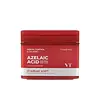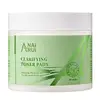What's inside
What's inside
 Key Ingredients
Key Ingredients

 Benefits
Benefits

 Concerns
Concerns

 Ingredients Side-by-side
Ingredients Side-by-side

Water
Skin ConditioningButylene Glycol
HumectantGlycerin
HumectantMethylpropanediol
Solvent1,2-Hexanediol
Skin ConditioningHydroxyacetophenone
AntioxidantAllantoin
Skin ConditioningEthylhexylglycerin
Skin ConditioningPanthenol
Skin ConditioningDisodium EDTA
Xanthan Gum
EmulsifyingSodium Hyaluronate
HumectantAzelaic Acid
BufferingCitric Acid
BufferingCapryloyl Salicylic Acid
ExfoliatingSalicylic Acid
MaskingGluconolactone
Skin ConditioningMadecassoside
AntioxidantCentella Asiatica Extract
CleansingPropanediol
SolventPropylene Glycol
HumectantMelaleuca Alternifolia Leaf Extract
PerfumingHydrolyzed Sodium Hyaluronate
Skin ConditioningHydrolyzed Hyaluronic Acid
HumectantDiospyros Kaki Leaf Extract
Skin ProtectingVitis Vinifera Fruit Extract
Skin ConditioningPolygonum Cuspidatum Root Extract
AntioxidantCoffea Arabica Seed Extract
MaskingCarthamus Tinctorius Flower Extract
Skin ConditioningCastanea Crenata Shell Extract
Skin ConditioningCamellia Sinensis Leaf Extract
AntimicrobialZanthoxylum Piperitum Fruit Extract
Skin ConditioningSodium Benzoate
MaskingSodium Acetylated Hyaluronate
HumectantHydroxypropyltrimonium Hyaluronate
Human Umbilical Mesenchymal Stem Cell Conditioned Media
HumectantDimethylsilanol Hyaluronate
HumectantSodium Hyaluronate Crosspolymer
HumectantPentylene Glycol
Skin ConditioningHyaluronic Acid
HumectantPotassium Hyaluronate
Skin ConditioningHuman Umbilical Mesenchymal Stem Cell Exosomes
Skin ConditioningWater, Butylene Glycol, Glycerin, Methylpropanediol, 1,2-Hexanediol, Hydroxyacetophenone, Allantoin, Ethylhexylglycerin, Panthenol, Disodium EDTA, Xanthan Gum, Sodium Hyaluronate, Azelaic Acid, Citric Acid, Capryloyl Salicylic Acid, Salicylic Acid, Gluconolactone, Madecassoside, Centella Asiatica Extract, Propanediol, Propylene Glycol, Melaleuca Alternifolia Leaf Extract, Hydrolyzed Sodium Hyaluronate, Hydrolyzed Hyaluronic Acid, Diospyros Kaki Leaf Extract, Vitis Vinifera Fruit Extract, Polygonum Cuspidatum Root Extract, Coffea Arabica Seed Extract, Carthamus Tinctorius Flower Extract, Castanea Crenata Shell Extract, Camellia Sinensis Leaf Extract, Zanthoxylum Piperitum Fruit Extract, Sodium Benzoate, Sodium Acetylated Hyaluronate, Hydroxypropyltrimonium Hyaluronate, Human Umbilical Mesenchymal Stem Cell Conditioned Media, Dimethylsilanol Hyaluronate, Sodium Hyaluronate Crosspolymer, Pentylene Glycol, Hyaluronic Acid, Potassium Hyaluronate, Human Umbilical Mesenchymal Stem Cell Exosomes
Water
Skin ConditioningAzelaic Acid
BufferingLactic Acid
BufferingSalicylic Acid
MaskingHamamelis Virginiana Water
AstringentAloe Barbadensis Leaf Juice
Skin ConditioningChrysanthellum Indicum Flower Water
AntimicrobialEpilobium Angustifolium Flower/Leaf/Stem Extract
Skin ConditioningButylene Glycol
HumectantPropylene Glycol
HumectantXanthan Gum
EmulsifyingGlycolic Acid
BufferingLactobionic Acid
Buffering1,2-Hexanediol
Skin ConditioningPentylene Glycol
Skin ConditioningWater, Azelaic Acid, Lactic Acid, Salicylic Acid, Hamamelis Virginiana Water, Aloe Barbadensis Leaf Juice, Chrysanthellum Indicum Flower Water, Epilobium Angustifolium Flower/Leaf/Stem Extract, Butylene Glycol, Propylene Glycol, Xanthan Gum, Glycolic Acid, Lactobionic Acid, 1,2-Hexanediol, Pentylene Glycol
 Reviews
Reviews

Ingredients Explained
These ingredients are found in both products.
Ingredients higher up in an ingredient list are typically present in a larger amount.
1,2-Hexanediol is a synthetic liquid and another multi-functional powerhouse.
It is a:
- Humectant, drawing moisture into the skin
- Emollient, helping to soften skin
- Solvent, dispersing and stabilizing formulas
- Preservative booster, enhancing the antimicrobial activity of other preservatives
Azelaic acid is a multitasker ingredient that helps treat acne, pigmentation, and irritation. It is a great option for sensitive skin.
What makes azelaic special?
The best thing about azelaic acid is it's gentleness. It's generally well-tolerated and safe to use alongside other actives like niacinamide or salicylic acid.
Unlike AHAs, azelaic acid will not make you photosensitive/sun sensitive.
You can find this ingredient naturally occurring in grains like wheat, rye, and barley. In cosmetics, azelaic acid is typically lab-made, which is more stable and effective.
Learn more about Azelaic AcidButylene Glycol (or BG) is used within cosmetic products for a few different reasons:
Overall, Butylene Glycol is a safe and well-rounded ingredient that works well with other ingredients.
Though this ingredient works well with most skin types, some people with sensitive skin may experience a reaction such as allergic rashes, closed comedones, or itchiness.
Learn more about Butylene GlycolPentylene glycol is typically used within a product to thicken it. It also adds a smooth, soft, and moisturizing feel to the product. It is naturally found in plants such as sugar beets.
The hydrophilic trait of Pentylene Glycol makes it a humectant. As a humectant, Pentylene Glycol helps draw moisture from the air to your skin. This can help keep your skin hydrated.
This property also makes Pentylene Glycol a great texture enhancer. It can also help thicken or stabilize a product.
Pentylene Glycol also acts as a mild preservative and helps to keep a product microbe-free.
Some people may experience mild eye and skin irritation from Pentylene Glycol. We always recommend speaking with a professional about using this ingredient in your routine.
Pentylene Glycol has a low molecular weight and is part of the 1,2-glycol family.
Learn more about Pentylene GlycolPropylene Glycol is an odorless, colorless liquid. As a humectant, it helps skin retain moisture. It also aids in delivering active ingredients.
Another role of this ingredient is preventing a product from melting or freezing. Propylene glycol also adds antimicrobrial properties to a product, elongating product lifespan.
This ingredient is considered an organic alcohol and commonly added into both cosmetics and foods.
Those with sensitive skin or conditions may develop a rash when using this ingredient.
Learn more about Propylene GlycolSalicylic Acid (also known as beta hydroxy acid or BHA) is a well-known ingredient for treating skin that struggles with acne and clogged pores. It exfoliates both the skin's surface and deep within the pores to help clear out buildup, control oil, and reduce inflammation.
Unlike AHAs (alpha hydroxy acids), salicylic acid is oil-soluble. This allows it to penetrate into pores which makes it especially effective for treating blackheads and preventing future breakouts.
Salicylic acid is also known for its soothing properties. It has a similar structure to aspirin and can calm inflamed or irritated skin, making it a good option for acne-prone skin that is also sensitive.
Concentrations of 0.5-2% are recognized by the U.S. FDA as an over-the-counter topical acne product.
It can cause irritation and/or dryness if one's skin already has a compromised moisture barrier, so it's best to focus on repairing that before introducing this ingredient into your routine.
While salicylic acid does not increase sun sensitivity, it’s still important to wear sunscreen daily to protect your skin.
If you are looking for the ingredient called BHA or Butylated Hydroxyanisole, click here.
Learn more about Salicylic AcidWater. It's the most common cosmetic ingredient of all. You'll usually see it at the top of ingredient lists, meaning that it makes up the largest part of the product.
So why is it so popular? Water most often acts as a solvent - this means that it helps dissolve other ingredients into the formulation.
You'll also recognize water as that liquid we all need to stay alive. If you see this, drink a glass of water. Stay hydrated!
Learn more about WaterXanthan gum is used as a stabilizer and thickener within cosmetic products. It helps give products a sticky, thick feeling - preventing them from being too runny.
On the technical side of things, xanthan gum is a polysaccharide - a combination consisting of multiple sugar molecules bonded together.
Xanthan gum is a pretty common and great ingredient. It is a natural, non-toxic, non-irritating ingredient that is also commonly used in food products.
Learn more about Xanthan Gum